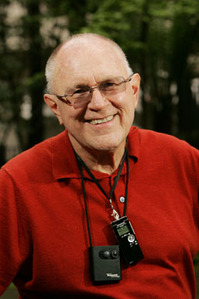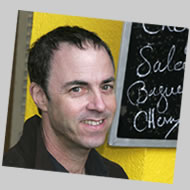What Tools Should I Use To Make Tracking Easier?
Alexandra Carmichael
December 6, 2009
Jeremy Johnson sent in this question for the illustrious QS Scientific Advisory Board, so we set about finding an answer for him. Gordon Bell and Seth Roberts responded with lightning speed! Jeremy’s question and their answers are below. If you have a question about your self-tracking that you’d like some help with, let me know.
———-
My purpose is to track multiple variables related to sleep, exercise, diet and supplements to make evidence-based decisions
to increase my energy level.
Variables are tracked in a Google doc, http://docs.google.com/Doc?
My question is, what existing tool (iPhone or web) will minimize the burden of data collection so this is sustainable?
———-
Gordon Bell’s Answer:
 Jeremy might start by tracking (aka recording) exercise, diet, sleep, work, his overall mood/stress level, and compare with how he feels about his energy level.
Jeremy might start by tracking (aka recording) exercise, diet, sleep, work, his overall mood/stress level, and compare with how he feels about his energy level.A couple of devices will focus on energy expended:
– BodyBugg captures energy expended using several measuring transducers;
– a plain old pedometer like the one from Oregon Scientific gives steps taken that is a stab at energy expended and it goes into your computer with no fuss or muss – all it requires is logging on to a site to be fed monthly.
Energy input (aka diet) is probably the most important and hardest to deal with. There are several packages like FitWatch that allow you to count calories. I did this for a few weeks to get the hang of calorie costs. A good kitchen scale is important.
Weight is important and change is just the difference of energy in – energy out. This says you really know your body. If you are overweight, reducing weight is clearly the easiest place to get energy!
Drugs: caffeine, vitamins, alcohol, etc. are all inputs I don’t understand or want to comment on. Less is probably more though.
Zeo looks interesting for sleep. A friend uses it. I haven’t bothered to try it because I am generally in a state of: What, me worry?
Stress. The BodyBugg actually tracks this through their skin resistivity sensor, but you can’t get hold of it. The company BodyMedia that sells them the device might make it available. This would tell how much stress one is under each day. A diary will have to suffice for now.
———-
Seth Roberts’ Answer:
 I use R to collect data. R is free open-source software. I can use it without internet access. On the other hand I cannot carry it around with me. If R is too difficult, I might use Google Docs.
I use R to collect data. R is free open-source software. I can use it without internet access. On the other hand I cannot carry it around with me. If R is too difficult, I might use Google Docs.
Jeremy, I think you are starting too big. You are trying to record too much. If I were you I would start by trying to record one thing day after day. It would be something I wanted to improve — maybe sleep or energy level.
After I’d managed to record one thing daily for several weeks then I would start doing little experiments. I would take one thing I can vary — say, how much coffee I drink. I start tracking it — measuring it each day. After several weeks, I would intentionally change it — say, drink less coffee — and see what happens for several weeks.
That’s three steps.
Step 1: Measure one thing you want to improve. Do that for several weeks.
Step 2: In addition, measure one thing you can easily control (e.g., coffee consumption, exercise) that might affect what you want to improve. Do that for several weeks.
Step 3: Change that thing you can easily control. See what effect that change has.
In other words, try to do the smallest easiest thing that will put you closer to your goal. That tiny little goal will be turn out to be much harder to reach than you imagine. In the beginning, the smallest easiest thing is to measure one variable day after day.
———-
Thanks to Jeremy for the question and to Gordon and Seth for their answers! Wonderful QS readers, please send in your questions and we’ll do our best to find answers for you.



